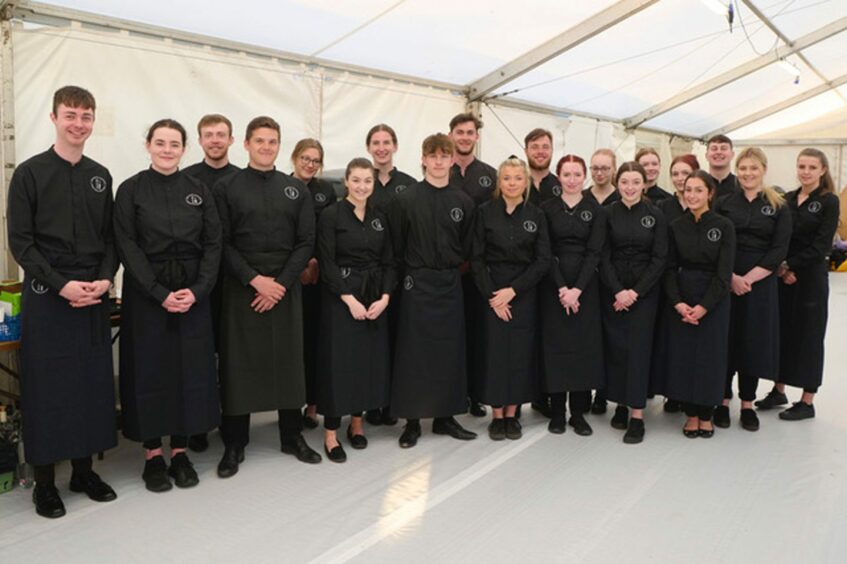Falling fuel prices saw the rate of inflation dip 0.2% to 9.9% in the year to August 2022.
But rising food costs still make the headline number close to a 40-year high.
Smaller, partially offsetting, upward effects came from price rises for food and non-alcoholic beverages, miscellaneous goods and services, as well as clothing and footwear according to the Office for National Statistics.
Cost of living crisis: what is inflation?
Yvonne and Mike Crook have been directors of events and outside Moy-based caterer Good Highland Food since 2003.
The business is facing rising costs across the supply chain, from food and drink to fuel, energy and staff – meaning some of those increases have had to be passed on.
Ms Crook said: “We are trying to balance investment opportunities in the business versus huge increases in costs – it has been very challenging making the right decisions.
“Our supplier relationship is critical to the success of Good Highland Food – the brand has been built firmly on the use of local produce and local stories, and so we are most concerned for their survival through these very challenging times.”
Ms Crook added it was important to ensure guests had an “increasingly better experience” where they felt they were seeing good value for their money, while it was also key to work with other Highland companies to improve the visitor experience.
Highlands hospitality academy mulled ‘for almost 30 years’
The events and catering director also noted a hospitality academy had been discussed for the Highlands for “almost 30 years,” adding: “If we have a world-class tourism product, we should aspire to developing a world-class hospitality academy.
“It would change the way the industry is viewed in the Highlands and could attract international students to study within such a unique natural environment.”
Hospitality firms often have to increase staff remuneration to retain employees and Good Food Highland is no exception, with the result it does not have an issue recruiting workers.
Ms Crook, who is also chairwoman of Highland Tourism, said: “We have increased staff wages and aim to again early next year but we can only continue to do that if we work as a community to raise the value of a guest/visitor experience to the Highlands and attract more high-end visitors.
“Reduced VAT and or business rates would certainly help, and there is also an opportunity for the public sector to work in partnership with community leaders to be part of strategic solutions.
“As an example, Good Highland Food is a small business but invested heavily in the establishment of Highland Tourism as a community interest company some 18 months ago.
“Precious time is slipping by, whilst the public sector considers how we can work together – the business and wider community need help now.
 “Highlands and Islands Enterprise (HIE) and Highland Council’s support as well as a range of other local government agencies in establishing the Highlands as a premium environmental brand will provide a basis where all businesses and communities attract higher value visitors that are willing to pay higher prices.
“Highlands and Islands Enterprise (HIE) and Highland Council’s support as well as a range of other local government agencies in establishing the Highlands as a premium environmental brand will provide a basis where all businesses and communities attract higher value visitors that are willing to pay higher prices.
“This is not an exclusive strategy – this is the most significant opportunity we collectively have with a world-class country sports, golf and adventure product in a world-class natural environment, and will provide the single biggest opportunity for businesses to mitigate risk as they aim for survival in the coming years.”
Scottish Friendly savings specialist Kevin Brown said the fall in inflation was “something of a surprise”.
Mr Brown added: “The problem for households is even if inflation is showing signs of slowing, they are unable to make confident personal financial decisions without knowing what is coming down the tracks until something approaching the status quo returns.
“The energy bill freeze will begin to help to alleviate some of the uncertainty, but this level is still well above where we were just 12 months ago.
Real-term pay cuts of 4.4%
“What is clear from yesterday’s wage data compared with the latest inflation figures is workers are getting real term pay cuts of 4.4%. This is even worse for public sector workers where pay rises are still stubbornly low at around 2% – a net pay cut of 7.9% – a clearly unsustainable level.
“For households wondering what they should do now, what is really important is to try to build up financial resilience wherever they can – a rainy day fund can be an essential way to protecting monthly budgets against unexpected costs.
“Longer-term saving and investing for the future might seem tricky too and we understand how difficult this is for many during this time, however, it remains an essential activity for households to undertake where possible.”



Conversation